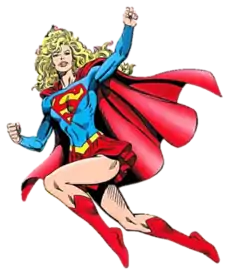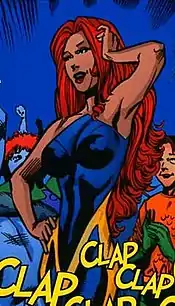Supergirl (Matrix)
Matrix is a fictional comic book superheroine, best known as the 1988–2002 Supergirl, published by DC Comics. She was created by John Byrne as part of his Superman revamp. She first appeared (as Supergirl) in Superman (vol. 2) #16 (April 1988).[1]
| Matrix | |
|---|---|
 Matrix as Supergirl, as appeared on the cover of Supergirl #1 (February 1994) by Kerry Gamill. | |
| Publication information | |
| Publisher | DC Comics |
| First appearance | Superman (vol. 2) #16 (April 1988) |
| Created by | John Byrne (based upon the Kara Zor-El created by Otto Binder and Al Plastino) |
| In-story information | |
| Alter ego | Matrix |
| Species | Artificial, protoplasmic lifeform |
| Place of origin | Earth in a parallel universe of unknown designation |
| Team affiliations | Teen Titans LexCorp |
| Notable aliases | Linda Danvers, Mae Kent, Supergirl, Clark Kent, Lana Lang |
| Abilities |
|
In 2006, another character calling herself Matrix was created by Geoff Johns, Grant Morrison, Greg Rucka, Mark Waid, and Dale Eaglesham and first appeared in 52.[2]
Fictional character biography
Encounter with Superman
In an alternate reality (a "pocket universe") three Kryptonian criminals (General Zod, Faora and Quex-Ul) escaped the Phantom Zone, and tried to take over that reality's Earth. There was no Superman in this reality (his younger self, Superboy, having died before the criminals' escape), but there was a Lex Luthor who had not turned evil. Using an artificial life-form called the "protoplasmic matrix", Lex created a red-headed woman, Matrix, who resembled his true love, the deceased alternate-reality Lana Lang. Matrix possessed all of Lana's memories, due to Lana's synaptic pathways being copied into Matrix. Lex had also patterned her physiology to resemble Superman's, whom he had seen by using one of his many inventions to look into the mainstream universe.
Like Superman, Matrix was superhumanly strong and fast, and could fly, but she also had the powers of shapeshifting, telekinesis, and cloaking (including invisibility). Matrix wore a version of Superman's uniform, shapeshifted into a young blonde woman, and fought the three criminals as Supergirl. However, her powers were no match for theirs. Desperate, Lex sent Matrix into the mainstream universe to recruit Superman. Her efforts were successful, and Superman did aid in stopping the Kryptonian criminals, but the alternate Earth had been ruined, and was now lifeless. Superman took the orphaned Matrix back to the mainstream DC Universe with him, where she served as the Post-Crisis world's first in-continuity Supergirl.

"Supergirl"
Upon arrival on the mainstream Earth, Matrix was taken to live with Superman's parents, the Kents. Jonathan and Martha did a fine job raising their new "daughter", but Matrix (or "Mae" as the Kents named her) became delusional for a time, believing she was Clark, even assuming his form. After a fight with the real Superman, Matrix came to her senses, but concerned that she might become unstable again and cause the Kents harm, she fled into outer space.
After many adventures, and after playing an important part in the "Panic in the Sky" storyline, she returned to Earth where she met and fell in love with the mainstream Lex Luthor (disguised at the time as his own son after his brain was transplanted into a younger clone of himself to escape the cancer that had been killing him after prolonged exposure to his kryptonite ring). Again donning the uniform her reality's Lex had given her (and once again in the form of the young blonde woman), she assumed the role of Supergirl in the mainstream DC Universe, determined to make this Earth a better one than the one she left. One of her first acts was to return to Smallville, Kansas, and reunite with her "parents", Jonathan and Martha Kent.
Her parents and Superman were shocked when they learned that their dear Mae was now dating Luthor. Mae began living with Lex, and even had an altercation with her "brother" Superman over it, although she did assure him that she would keep his secret regardless.
During The Death of Superman story arc, Matrix was eager to help in the fight against the menacing Doomsday, but Lex kept her at bay, keeping her with him by arguing that the city needed her there while Superman was otherwise occupied (although he was also secretly convinced that Superman was in no real danger after all the times Luthor's own plans to kill him had failed). When Doomsday reached Metropolis, she rebelled against Lex and went to fight the monster, only to be knocked out in a single blow, forcing her to subconsciously take her true form of a gray, humanoid mass.
When Superman died stopping Doomsday, Supergirl used her powers to protect Metropolis, but was met with some derision, as many people saw her as Luthor's "pet". She did an admirable job of rescuing victims, teaching the new hero Superboy about the importance of being serious when saving lives, and helped Superman return once he was found to be alive again. She even posed as Clark Kent, pretending that Clark had been trapped in a well-stocked cellar during Doomsday's initial attack, to help explain why Clark was gone while Superman was dead.
Her biggest shock came when she learned that Lex had cloned her, making thousands of his own personal "Supergirls". She went berserk, and destroyed his lab, his clones, and almost killed Lex before he fell into a paralytic coma due to flaws in the process that had created his new body. She decided to join the Teen Titans for a short while, but left shortly afterwards, realizing that it just was not for her.
Earth-born angel
After some soul searching, Mae began to wonder if she was even a real person or if she even had a soul. This was solved when she held the hand of a dying girl named Linda Danvers. Matrix's shapeshifting ability merged the two into the new Supergirl and Mae became the Earth Angel of Fire, simultaneously losing her shapeshifting abilities as she subconsciously defined herself as just Linda and Supergirl. The remnants of her protoplasmic form that were not absorbed in the merger became an evil, insane Matrix, who fought the Mae/Linda merged Supergirl, until she was absorbed by Blithe, the Earth Angel of Light. Later, when the good aspect of Matrix was separated from Linda, she was merged with Twilight, and became a new Angel of Fire.
Reign in Hell
In Reign in Hell #1 (September 2008), the Shadowpact attacks Linda Danvers in her Gotham City apartment, which makes Linda fight back. She manifests the flaming wings she had while merged with Matrix, but still loses to the collective powers of Blue Devil and the Enchantress. However she is teleported to Hell, as Hell is recalling all of its "debts".
In Reign in Hell #6 (February 2009), Linda reappears in the Doctor Occult backstory. She appears as a fallen angel summoned by Lilith, but mysteriously released.
Behind the scenes
Post-Infinite Crisis, the Matrix Supergirl has been seen in a scene showing the events from Zero Hour in 52[4] in the History of the DC Universe back-ups by Dan Jurgens. According to an interview with Newsarama, following the events of Infinite Crisis, Dan DiDio stated that the Matrix Supergirl was wiped from existence. However, Geoff Johns later stated, "As for this...huh? Linda Danvers has not been retconned out at all."[5] The question of the canonicity and fate of both Matrix and Linda Danvers was a subject of debate for several years until 2008 when Linda Danvers was used in the Reign in Hell miniseries. However, the future of Matrix remains uncertain. Her origin may be in flux due to the events of Infinite Crisis and the multiversal instability hinted at in Booster Gold, but her existence has been confirmed at least. As of The New 52, a relaunch of all DC properties, the new Supergirl from Krypton again is the only woman to have ever been Supergirl on Earth. Because of the new timeline, all of the events of Matrix may not have happened as other characters in Superman's life have substantially different back stories, such as the Kents having died before Clark left Smallville, and Superboy being designed as a weapon. Also, the Death of Superman story arc itself is still in question as it has not yet been shown how or if it happened in the new universe.
Powers and abilities
The Matrix was a protoplasmic life-form who possessed a malleable genome that enabled her to rearrange her constitution at the cellular level, allowing her to alter her appearance and physiology to anything of similar size and mass, able to replicate voices and mannerisms. Beyond shapeshifting, her central power was telekinesis; enabling her to move large objects through sheer force of thought as well as significantly increase her own strength and resistance to injury to levels approaching that of a Kryptonian such as her namesake mentor, Superboy.
Her kinetic ability also extended to levitation, supersonic flight, energy blasts, as well as the ability to rearrange molecules through touch. She also possessed the power to become invisible by blending into the background as well as inaudible, even to Superman's super-hearing. After her merging with Linda Danvers, the Matrix has since lost its shapeshifting abilities and is now bound by the constraints of human psychology in addition to her original weaknesses of physical fatigue and emotional vulnerability, including losing her sense of self-identity.
Other versions

In the 52 storyline,[6] a new heroine named Matrix appears as a member of Infinity, Inc. This Matrix is a redhead named Sierra who speaks with a Southern accent. She displays superhuman strength and invisibility, like the original Matrix. When Obsidian attacked the newest member of Infinity Inc., the new Jade, Matrix also showed flight and invulnerability powers when she tried to fight him off.
References
- Superman (vol. 2) #16 (April 1988)
- 52 #25 (October 25, 2006)
- Superman (vol. 2) #21 — art by John Byrne
- 52 #7
- Geoff, We need to talk - Page 2 - The Comic Bloc Forums Archived 2010-01-06 at the Wayback Machine
- 52 #25 — artwork by Dale Eaglesham